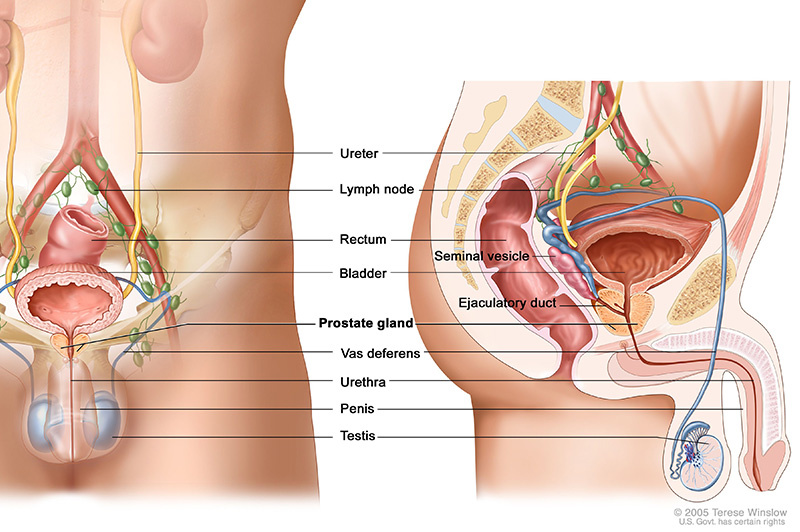
PROSTATE SERIES 3
We got questions on what might happen if someone with prostate enlargement is not treated. What If they are not bothered about the urinary symptoms and are not embarrassed by them?
This article will address the question of complications of delayed treatment, as well as prostate-friendly diet.
Must one get treatment irrespective of the absence of worrisome symptoms?
I would opine that the phrase “worrisome symptoms” is relative. Symptoms might start so
gradually that the individual has now adapted to these changes and perceived them as mild.
Meanwhile, a lot of damage is going on which needs to be addressed to forestall complications.
More so, the cost of a permanent solution and the fear of complications can make the individual trivialize their symptoms or refuse to fully disclose the extent of their symptoms as it affects their daily activities.
Irrespective of the severity of symptoms, structural changes are happening in your bladder, kidneys, and the compressed urethra which is putting you at risk of other unpleasant complications such as kidney failure and urinary tract infections (UTI) which may lead to infection in your blood (sepsis).
What are the Complications of Prostate enlargement?
The prostate has smooth muscles which contract (squeeze) and relaxes. In Benign prostatic hyperplasia (BPH), the frequency of prostate smooth muscle contraction increases, obstructing the bladder neck. In addition, compression of the urethra from an enlarged prostate leads to compression of the beginning of the conduit pipe taking urine out of your body (prostatic urethra).
To overcome the resistance to urine flow, the bladder muscle has to contract forcefully and with time, it ceases to contract with so much force.
Problems that may arise from this enlargement are bladder outlet obstruction (BOO) and
urinary retention, changes in the bladder that results in bladder stones, UTI, bloody urine, and kidney failure.
Urinary retention
Prostate enlargement (BPH) is the most common cause of bladder outlet obstruction in men.
This may cause either a sudden (acute) or gradual urinary retention.
Acute urinary retention happens suddenly and is an emergency as the retention needs to be relieved immediately. Chronic urinary retention on the other hand is gradual and often
painless. The individual can urinate but does not empty the bladder completely.
When this happens, the lower abdomen can become swollen from a bladder filled with urine.
There can be an inadvertent voiding of urine which the person has no control over. This is called overflow incontinence.
Complications may arise from the management of urinary retention. In some cases, the passing of urethral catheters may cause injury to the urethra either due to inadequate lubrication of the urethra before catheter insertion or a poor insertion technique. Scarring in the urethra can follow a traumatic catheterization, which may lead to a urethral stricture
(permanent narrowing of the urethra) and rupture. When there is difficulty with inserting a urethra catheter through the penis due to a stricture, it is best to insert it directly into the bladder through the lower abdomen to avoid urethral rupture. This is called a suprapubic catheter.
Urinary tract infections
The urinary tract is made up of the pipe taking urine from either of the 2 kidneys to the urinary bladder (ureters), the urinary bladder, and a urethra.
Your body removes infectious agents in the tract when you urinate and empty your bladder.
The passage of urine helps to wash away infectious bacteria.
Now, if there’s an obstruction that causes urine to stay in the bladder for a longer time, it becomes conducive for germs to take root and grow. Secondly, frequent instrumentation of
the urethra by inserting catheters can expose an individual to urinary tract infections.
Gross haematuria
Blood in the urine is a symptom of prostate enlargement. Prostate cancer and UTI can also cause haematuria, hence the need for further tests to differentiate between these.
Bladder stones
Urine that stays in the bladder for long begins to crystalline to form stones within the bladder. urine contains different types of salts which, when concentrated, can form stones Impaired kidney function Bladder outlet obstruction, when untreated, may cause impairment in kidney function which may progress to kidney failure and the need for dialysis.
Does BPH go away without treatment?
The mild form may have a significant reduction in symptoms with only lifestyle changes.
However, the enlargement is progressive but can be slowed down with diet and some medications.
In severe cases, your doctor may offer surgery and will talk with you about the various surgical options with their merits and demerits. Your urologist may also recommend the procedure that would be the best fit for you.
Prostate friendly diet
Research has shown that certain foods may help improve prostate health by slowing down the rate of progression of enlargement.
These are foods that are rich in zinc: examples of these are:
- Sesame seed is also called Bene seed in Nigeria or ridi in Hausa language.
- Almond nuts.
- Pumpkin seeds
Foods that are rich in omega-3 fatty acids such as:
- Salmon fish
- Tuna fish
- Walnuts,
- Chia seeds
- Flax seeds.
Lycopene-containing foods slow down the rate of progression of BPH. Examples are:
- Pawpaw.
- Tomatoes
- Watermelon
Green leafy vegetables and cruciferous vegetables like
- Cabbage
- Broccoli
- Cauliflower
Garlic and onions have anti-inflammatory properties and high flavonoid content, which plays a role in reducing the progression of BPH.
In conclusion, prevention of complications with early treatment is better than waiting to develop complications that may drastically reduce the quality of life or lead to death.